Featured
 Florida Gov. DeSantis leads the GOP’s national charge against public education that includes lessons on race and sexual orientation. By Jonathan Feingold / The Conversation
Florida Gov. DeSantis leads the GOP’s national charge against public education that includes lessons on race and sexual orientation. By Jonathan Feingold / The Conversation
Florida Gov. Ron DeSantis’ disdain for “woke ideology” is on full display. At a January 2023 inaugural event, the governor boasted that “Florida is where woke goes to die.” This is more than political bluster.
In just the past month, DeSantis has stacked the board of the New College of Florida, a well-known liberal arts college, with right-wing ideologues and has directed universities to report their diversity efforts and critical race theory classes to his office. So what, precisely, does Desantis – a potential 2024 presidential nominee – oppose? Read more
Related: A Black professor defies DeSantis law restricting lessons on race. By Lori Rozsa / Wash Post
Related: Florida rejects AP African American studies course. By Juliana Kim / NPR
Political / Social
 States Push for New Voting Laws With an Eye Toward 2024. By Neil Vigdor / NYT
States Push for New Voting Laws With an Eye Toward 2024. By Neil Vigdor / NYT
Republicans are focused on voter ID rules and making it harder to cast mail ballots, while Democrats are seeking to expand access through automatic voter registration.
The tug of war over voting rights and rules is playing out with fresh urgency at the state level, as Republicans and Democrats fight to get new laws on the books before the 2024 presidential election. States like Florida, Texas and Georgia, where Republicans control the levers of state government, have already passed sweeping voting restrictions that include criminal oversight initiatives, limits on drop boxes, new identification requirements and more. Read more
Related: Clear as mud’: Ohio’s new voting restrictions from GOP raise alarm. By Meryl Kornfield / Wash Post
 Treasury Department Study: White People Get 90 Percent of the Benefits of Many Tax Breaks. By Stephanie Mencimer / Mother Jones
Treasury Department Study: White People Get 90 Percent of the Benefits of Many Tax Breaks. By Stephanie Mencimer / Mother Jones
Republicans have never seen a tax break they didn’t love, even though they cost more than poverty programs.
This week, the Treasury Department released a study looking at racial disparities in the benefits that come through the tax code—like special lower tax rates for capital gains or deductions for employer-provided health insurance. In theory, these policies are color-blind. But the Treasury report shows that they are anything but. Read more
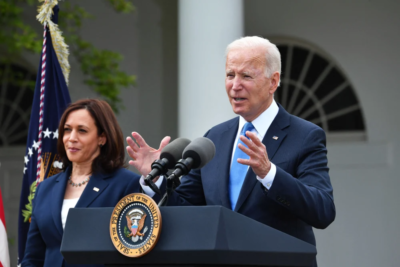 Biden admin releases first plan to support Asian American, Pacific Islander and Native Hawaiian communities. By Kimmy Yam / NBC News
Biden admin releases first plan to support Asian American, Pacific Islander and Native Hawaiian communities. By Kimmy Yam / NBC News
The plan’s priorities are combating anti-Asian hate and discrimination, the disaggregation of data across the communities and better language access, according to the report.
More than two dozen officials and community leaders gathered to formally unveil a strategy that was spearheaded by the White House Initiative on Asian Americans, Native Hawaiians, and Pacific Islanders. It includes action plans from 32 different federal agencies. Among the administration’s priorities are combating anti-Asian hate and discrimination, the disaggregation of data across the communities and better language access, according to the report. Read more
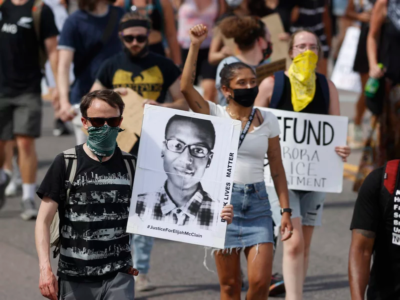 Colorado police and paramedics plead not guilty in Elijah McClain death. By AP and NPR
Colorado police and paramedics plead not guilty in Elijah McClain death. By AP and NPR
A group of police officers and paramedics pleaded not guilty Friday to charges stemming from the role they are accused of playing in the death of a 23-year-old Black man who was forcibly restrained and injected with a powerful sedative called ketamine.
They were indicted by a state grand jury on manslaughter, criminally negligent homicide and other charges in 2021. Two years earlier, Elijah McClain died after being stopped while walking down the street in the Denver suburb of Aurora. A 911 caller had reported a man who seemed “sketchy.” Read more
 Historically Black Catholic university announces new medical college to meet dire shortage. By Peter Finney Jr. / NCR
Historically Black Catholic university announces new medical college to meet dire shortage. By Peter Finney Jr. / NCR
Xavier University of Louisiana, which for decades has placed the most African American graduates into medical schools across the country each year, will open a College of Medicine in a partnership with Ochsner Health, executives of Xavier and Ochsner announced Jan. 17.
The new medical school, expected to open within four to five years, has as its primary goals building a pipeline of African American doctors for a health-care field in which people of color are underrepresented and extending the founding mission of St. Katharine Drexel “to promote a more just and humane society,” said Xavier President Reynold Verret. Read more
 Foundation empties coffers to fund Black paper in Baltimore. By AP and NBC News
Foundation empties coffers to fund Black paper in Baltimore. By AP and NBC News
Baltimore Beat co-founder Lisa Snowden-McCray and Adam Holofcener, of the Lillian Holofcener Charitable Foundation, in Baltimore in October.
In a rare move for philanthropy, Adam Holofcener and his family emptied their foundation’s coffers and gave $1 million — nearly all the money it had left to give — to support Lisa Snowden-McCray’s dream: a free newspaper staffed by Black editors and writers in Baltimore to provide news primarily for the city’s Black residents. Read more
Ethics / Morality / Religion
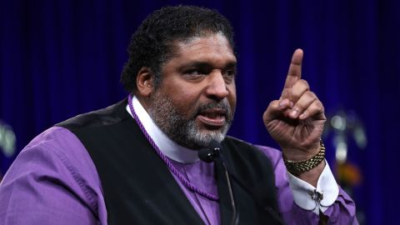 Pastor William Barber says Christian nationalism is ‘a form of heresy.’ By John Blake / CNN
Pastor William Barber says Christian nationalism is ‘a form of heresy.’ By John Blake / CNN
Left vs. right. Woke vs. the unwoke. Red State Jesus vs. Blue State Jesus. There are some leaders who see faith and politics strictly as an either/or competition: You win by turning out your side and crushing the opposition.
But the Rev. William J. Barber II, who has been called “the closest person we have to MLK” in contemporary America, has refined a third mode of activism called “fusion politics.” It creates political coalitions that often transcend the conservative vs. progressive binary. Barber, a MacArthur “genius grant” recipient, says a coalition of the “rejected stones” of America—the poor, immigrants, working-class whites, religious minorities, people of color and members of the LGBTQ community can transform the country because they share a common enemy. Read more
Related: White Christian nationalism isn’t pro-life. It’s pro-order. By Andrew Whitehead / RNS
 Donald Trump is smothering the religious right. By Heather Digby Parton / Salon
Donald Trump is smothering the religious right. By Heather Digby Parton / Salon
Nothing has exposed the moral bankruptcy of the Christian Right more than its ecstatic embrace of a lying libertine
As FiveThirtyEight pointed out a few years back, during this period of conservative Christian dominance the country has been growing much less religious and studies have found that this is mainly a result of public distaste for the GOP’s merging of religious social conservatism with politics. And nothing has exposed the moral bankruptcy of the Christian Right more than its ecstatic embrace of the lying libertine Donald Trump. They have been among his most fervent admirers, accounting for the single largest bloc of support in the GOP. Read more
Related: Losing their religion: why US churches are on the decline. By Adam Gabbatt / The Guardian
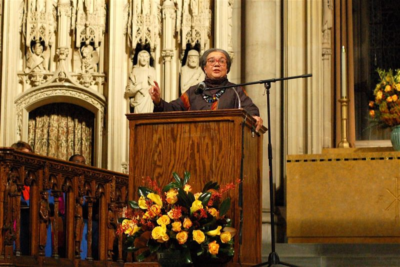 Black Religious Fostering of American Civic Ideals. By R. Drew Smith / AAIHS
Black Religious Fostering of American Civic Ideals. By R. Drew Smith / AAIHS
Marian Wright Edelman, January 14, 2007 (Wikimedia Commons)
Black Christians have been key agents in a centuries-long effort to prevent American democracy from succumbing to its own inherent contradictions and self-destructive tendencies. Strategic to the promotion and preservation of American democracy has been the reinforcement of the idea of a broadly construed American public, and a robust vision of the public good. Even when America’s core democratic ideals have been abandoned by those formally entrusted with their preservation, notable Black Christian leaders have been on the front lines in defending those principles—a fostering of those ideals in both senses of that word. Read more
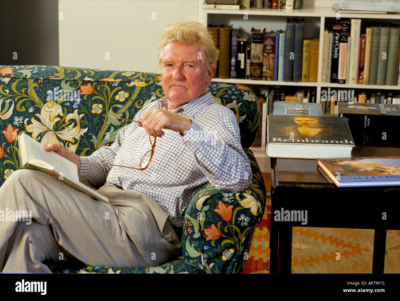 A great historian unlocks the key to antisemitism. By Paul Johnson / RNS
A great historian unlocks the key to antisemitism. By Paul Johnson / RNS
He “got” the Jews — even more than the Jews do.
Paul Johnson, who died last week at the age of 94, was a prolific journalist, anthologist, speechwriter, and a popular historian. His histories were on such huge subjects as Christianity, England, the United States, modern history, and art, not to mention numerous biographies. And, Judaism. Johnson was not a Jew, but he wrote the book that is, IMHO, the most accessible and readable general history of the Jews – A History of the Jews. Read more
Historical / Cultural
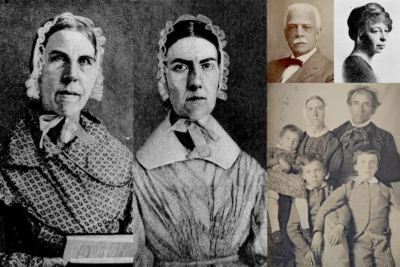 Slavery’s Indelible Stain on a White Abolitionist Legend. By Michael Jeffries / NYT
Slavery’s Indelible Stain on a White Abolitionist Legend. By Michael Jeffries / NYT
“The Grimkes,” by the historian Kerri Greenidge, provides a nuanced, revisionist account of an American family best known for a pair of white abolitionist sisters.
Born at the turn of the 19th century, the Grimke sisters, Angelina and Sarah, left their slaveholding family in Charleston, S.C., as young adults and made new lives for themselves as abolitionists in the North.“The Grimkes” is a family biography. In addition to the stories of Sarah Grimke and Angelina Grimke Weld, it recounts the lives of their Black nephews, Archibald (Archie), Frank and John; Frank’s wife, Lottie Forten Grimke; and Archie’s daughter, the Harlem Renaissance writer Angelina Weld Grimke. It’s an ambitious book, not only because of its large cast of characters, but because it offers so many insights about racial strife in the United States. Read more
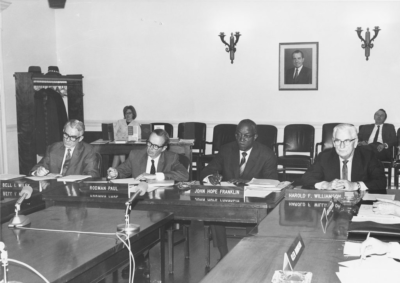 John Hope Franklin and WWII as a Crisis of Democracy. By Thomas Cryer / AAIHS
John Hope Franklin and WWII as a Crisis of Democracy. By Thomas Cryer / AAIHS
John Hope Franklin at the Archives Advisory Council meeting, May 8, 1970 (National Archives)
Like many Black intellectuals of the era, Franklin interpreted WWII as a prime indicator of the hypocrisy of American democracy as segregated armies fought to combat racial terror abroad. This was most apparent when Franklin was segregated from white German prisoners of war on a train from Greensboro to Durham in 1945, one of many personal anecdotes he would frequently recount in his later life to recall the realities of Jim Crow. War and post-war settlement consistently appear in Franklin’s scholarship as crises of democracy that brought both windows for social advancement and violent racial retrenchment. Read more
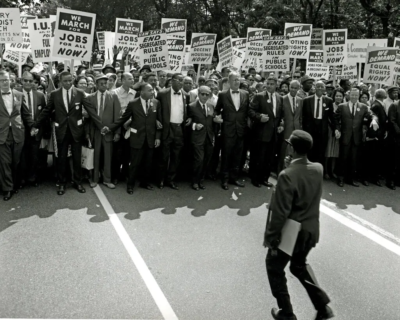 What A. Philip Randolph Knew About Jobs and Freedom. By Jamelle Bouie / NYT
What A. Philip Randolph Knew About Jobs and Freedom. By Jamelle Bouie / NYT
The March on Washington for Jobs and Freedom in 1963. A. Philip Randolph is in the front, second from right.Credit…PhotoQuest/Getty Images
A. Philip Randolph, the labor leader and civil rights activist whose work in the 1930s, ’40s and ’50s was crucial to the growth and success of the civil rights movement. He had a starring role at the 1963 March on Washington for Jobs and Freedom, which itself was the culmination of an effort Randolph had begun in 1941 with his fellow activist Bayard Rustin and other allies in the civil rights and labor movements. Read more
 How to Divide the Working Class. By Charles M. Blow / NYT
How to Divide the Working Class. By Charles M. Blow / NYT
The burning of the Colored Orphan Asylum in New York set off the Draft Riots of 1863.Credit…Bettmann Archive/Getty Images
New York City was the site of one of the deadliest riots in United States history 160 years ago this year. It was the draft riots of 1863, in the middle of the Civil War. New York then was hardly the monolithic liberal bastion it has since become. Conservative, antiwar Democrats, known as Copperheads, were enraged by the onset of the Civil War, and they were vocal opponents of Abraham Lincoln’s war policies. They saw abolitionists as agitators and their call to end slavery as an affront to states’ rights. Read more
 The five Black governors who came before Maryland’s Wes Moore. By Gillian Brockell / Wash Post
The five Black governors who came before Maryland’s Wes Moore. By Gillian Brockell / Wash Post
Oscar Dunn, ca. 1860-1865, left, and P.B.S. Pinchback, ca. 1870-1880. (National Archives; Brady-Handy Photograph Collection, Library of Congress)
When Wes Moore takes the oath of office as Maryland governor on Wednesday, he’ll move into a governor’s mansion surrounded by history. Within blocks of the residence is a statue of Kunta Kinte, an enslaved African brought to Annapolis in 1767 and made famous by author Alex Haley; the William Paca House, the former mansion of a previous governor and enslaver; and a statue of Thurgood Marshall, the first African American on the U.S. Supreme Court. Here’s a brief introduction to the Black governors who came before Moore. Read more
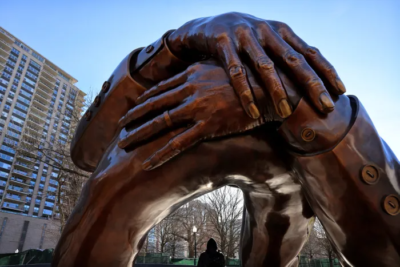 The Controversy Over Boston’s ‘Embrace’ Memorial to MLK. By Diana Budds / New York Magazine.
The Controversy Over Boston’s ‘Embrace’ Memorial to MLK. By Diana Budds / New York Magazine.
The Problem With Boston’s MLK Memorial Isn’t That It Looks Like a Penis
A new statue commemorating Martin Luther King Jr. and Coretta Scott King was unveiled in Boston over the weekend. Titled The Embrace, it’s a 20-foot-tall bronze sculpture of arms locked in a hug, the pose borrowed from a famous photograph of the couple that was taken when MLK won the Nobel Prize in 1964. At the dedication ceremony, Martin Luther King III said the statue “truly signifies the bonds of love shared by my parents.” But depending on the angle from which it’s viewed, the disembodied arms looked to many like … something else. Read more
 Black Music Sunday: Celebrating Sam Cooke’s legacy on his birthday. By Denise Oliver Velez / Daily Kos
Black Music Sunday: Celebrating Sam Cooke’s legacy on his birthday. By Denise Oliver Velez / Daily Kos
Sam Cooke at the RCA Recording Studio in Los Angeles, circa 1959.
When thinking about songs and songwriters whose work has changed the way we may feel about our situation in life and in history, I often think of Sam Cooke. He was born Samuel Cook to a Baptist preacher in Clarksdale, Mississippi, on this day in 1931, and like many Black artists of the time, got his start singing in the church. Read more and listen here
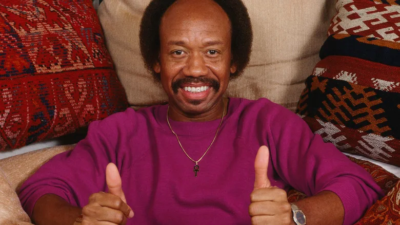 How Earth, Wind and fire Became Symbols of Black Emancipation. By William Kennedy / Grunge
How Earth, Wind and fire Became Symbols of Black Emancipation. By William Kennedy / Grunge
Shown is Maurice White EWF founder
The band Earth, Wind & Fire (EWF) were about more than just the good vibes and positive feelings expressed in some of their biggest hits. With an upbeat sound, EWF also represented freedom and liberty to the quickly-growing middle class Black community, according to NPR, writing in 2016 on the occasion of EWF founder Maurice White’s death (White is pictured). From the 1970s, EWF were never overtly political, with songs like “Shining Star” and “September” otherwise being infectious disco-funk anthems. Since White died, EWF still tours with an updated lineup (via Britannica). Read more
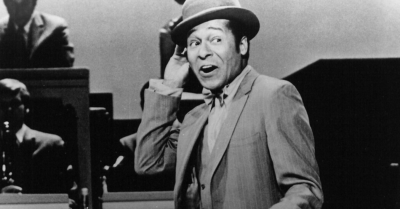 Arthur Duncan, Barrier-Breaking Tap Dancer, Is Dead at 97. By Richard Sandomir / NYT
Arthur Duncan, Barrier-Breaking Tap Dancer, Is Dead at 97. By Richard Sandomir / NYT
One of the first Black regulars on a TV variety show, he brought tap to millions of viewers on “The Lawrence Welk Show” after Betty White gave him his first big break.
There were more renowned tap dancers during his long career — Bill Robinson, Sammy Davis Jr. and Gregory Hines among them — but only Mr. Duncan had a regular national television showcase like the one he had on Saturday nights on the popular if square Welk show, from 1964 to 1982. Read more
Sports
 Baseball’s first plan for Negro League stars: A separate Hall of Fame wing. By Frederic J. Frommer / Wash Post
Baseball’s first plan for Negro League stars: A separate Hall of Fame wing. By Frederic J. Frommer / Wash Post
Buck Leonard was inducted into baseball’s Hall of Fame in 1972. (AP)
When the Baseball Hall of Fame finally — and belatedly — agreed to admit Negro League stars into its ranks a half-century ago, there was a catch: They would be honored in a separate section. The resulting outrage forced a change in policy, leading to the eventual induction of more than 40 men who spent all or part of their careers in the Negro Leagues. Read more
 Bomani Jones Calls an Audible. By Jason Zinoman / NYT
Bomani Jones Calls an Audible. By Jason Zinoman / NYT
“Game Theory,” his HBO talk show, has pulled off the difficult feat of mixing sports and comedy with a political bite. Now he’s trying to up his game by going unscripted.
You know Bomani Jones is about to say something funny, deadly serious or both when he spits out a sentence like “The question is simple” or “Let me tell you a secret” or, in this case, “Here’s the thing.” Explaining why he no longer regularly debates sports with people on television, Jones, 42, paused dramatically, his lanky frame swimming in sweatpants as he sat on the sofa of his Harlem apartment. “Don’t no one want to argue with me on television,” he said, a snap in his voice, dropping into a baritone. “Ain’t a whole lot of people going to come out a winner. As a result, I don’t come out a winner. I just come out a bully.” Read more
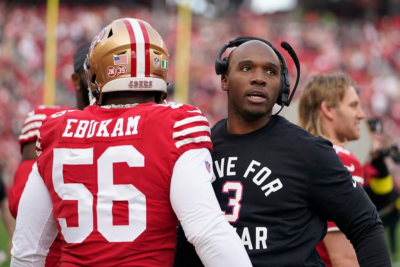 DeMeco Ryans may be the NFL’s next Black coach. Should he want to be? By Kent Babb / Wash Post
DeMeco Ryans may be the NFL’s next Black coach. Should he want to be? By Kent Babb / Wash Post
San Francisco 49ers defensive end Samson Ebukam talks with defensive coordinator DeMeco Ryans before facing the Arizona Cardinals in Santa Clara, Calif., on Jan. 8. (Godofredo A. Vásquez/AP)
Throughout the league’s history, head coaches have neither risen this quickly nor traditionally looked like DeMeco Ryans. Ryans is Black, and the NFL isn’t exactly a place where the sky is the limit for Black coaches, no matter how beloved or skilled. The NFL has adamantly denied that its hiring practices are racist despite the fact that only two of its 32 teams are led by Black men, that former Miami Dolphins coach Brian Flores headlines an ongoing class-action discrimination lawsuit against the NFL or that a recent Washington Post investigation found that, in a league where nearly 60 percent of the players are Black, teams’hiring and firing practices continue to disadvantage Black coaches at every turn. Read more
 On MLK Day, Malcolm Brogdon has a personal civil rights leader to look up to. By Marc J. Spears / Andscape
On MLK Day, Malcolm Brogdon has a personal civil rights leader to look up to. By Marc J. Spears / Andscape
The Boston Celtics guard’s grandfather, John Hurst Adams, was ‘a pioneer in many ways,’ as a bishop, an outspoken activist and a college president
“For me, my grandfather is my MLK,” Brogdon recently told Andscape. “That’s the person that really led the way for me, that showed me how to live a decent life, how to be a decent man, and how to impact millions of people.” Adams was a former bishop of the African Methodist Episcopal Church, an outspoken social justice activist and a former college president. There were respectful headlines all over the nation when King’s college classmate passed away at age 90 on Jan. 10, 2018, in Atlanta. The Brogdon Family Foundation celebrates the legacy of Brogdon’s grandfather with the JHA Project, which supports education for children worldwide through literacy programming, mentoring and experiences. Read more
Site Information
Articles appearing in the Digest are archived on our home page. And at the top of this page register your email to receive notification of new editions of Race Inquiry Digest.
Click here for earlier Digests. The site is searchable by name or topic. See “search” at the top of this page.
About Race Inquiry and Race Inquiry Digest. The Digest is published on Mondays and Thursdays.
Use the customized buttons below to share the Digest in an email, or post to your Facebook, Linkedin or Twitter accounts.